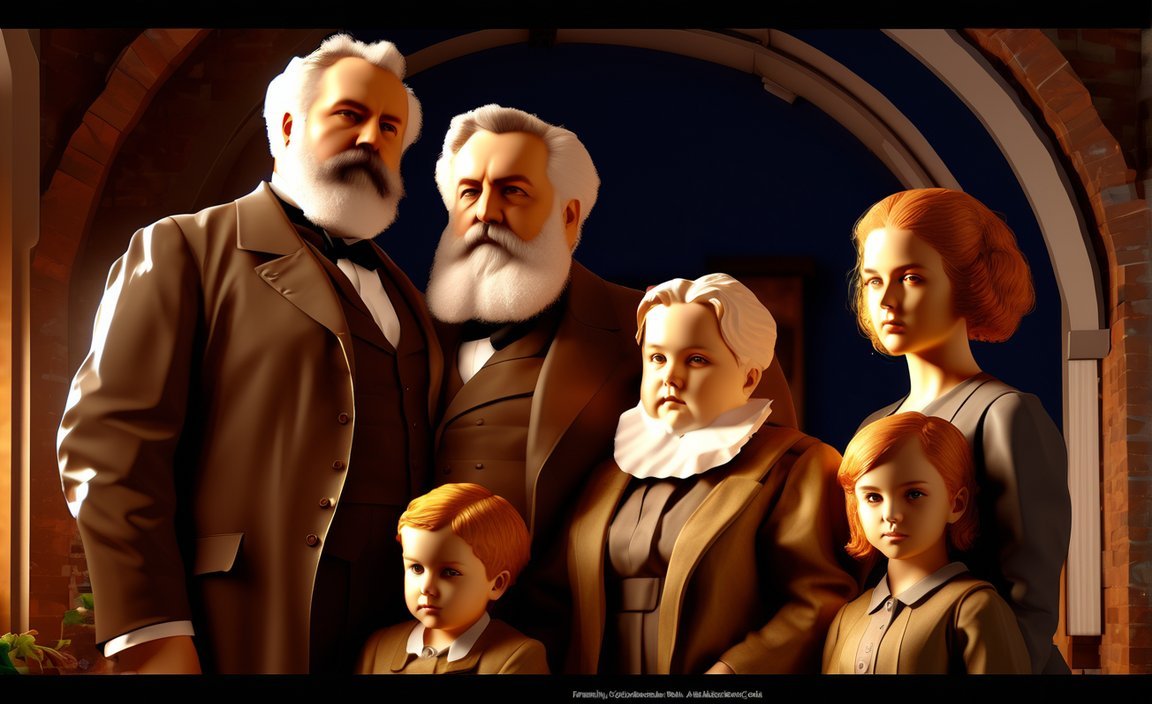The Legacy of Alexander Graham Bell’s Remarkable Family explores the vital contributions and enduring impact of one of history’s most remarkable families. From the groundbreaking inventions of Alexander Graham Bell, such as the telephone, to the fascinating family history and the challenges they faced, this article delves into the importance of their legacy. Despite encountering over 600 lawsuits over Bell’s patent, the Bell family’s ingenuity, perseverance, and enduring influence continue to shape our society to this day.

Key Takeaways:
- Alexander Graham Bell, the inventor of the telephone, was born and raised in Edinburgh, Scotland, to parents involved in phonetics and deaf education.
- Both of Bell’s brothers died from tuberculosis, a disease that ran in their family.
- Bell patented the first practical telephone in 1876, revolutionizing communication and laying the foundation for modern telecommunications systems.
- He married Mabel Hubbard, who provided significant support for his inventions and projects, and they had four children together, two of whom died in infancy.
- Bell’s legacy extends beyond the telephone, as he continued to innovate and work on projects such as refining the phonograph and using light to transmit sound.
- His contributions as an inventor and scientist have had a profound impact on communication technology and continue to inspire future generations.
Family of Alexander Graham Bell
Early Life and Family
Alexander Graham Bell, the renowned inventor of the telephone, was born in Edinburgh, Scotland, on March 3, 1847. He came from a family with a rich history and legacy. His father, Alexander Melville Bell, was a well-known phonetician, and his mother, Eliza Grace Symonds, was a deaf woman. Bell had two brothers, Melville James and Edward Charles, both of whom tragically passed away due to tuberculosis.
Invention of the Telephone
Alexander Graham Bell’s most notable invention is undoubtedly the telephone. In 1876, he patented the first practical telephone, forever changing the way people communicate. This groundbreaking invention transformed society and laid the foundation for the modern telecommunications systems we rely on today.
Marriage and Children
In 1877, Alexander Graham Bell married Mabel Hubbard, a deaf woman who played a significant role in supporting his inventions and projects. Together, they had four children. They had two sons who, unfortunately, passed away in infancy, while their daughters, Elsie and Marian, grew up to lead remarkable lives of their own.
Elsie Bell: A Beacon of Philanthropy
Elsie Bell, the daughter of Alexander Graham Bell, dedicated her life to philanthropy. She focused on various causes, including education and research on hearing impairment. Elsie was passionate about helping those with hearing loss and made significant contributions to organizations such as the Alexander Graham Bell Association for the Deaf and Hard of Hearing.
Marian Bell Fairchild: A Legacy in the Arts
Marian Bell Fairchild, another daughter of Alexander Graham Bell, established a strong legacy in the arts. She was an accomplished painter and sculptor whose works gained recognition both nationally and internationally. Marian’s talent and dedication to her craft showcased the creativity and artistic inclination that ran in the Bell family.
The Bell Family Legacy
The family of Alexander Graham Bell is not only defined by his own remarkable achievements but also by the impact each family member made in their respective fields. From Alexander Melville Bell’s influential work in phonetics to Elsie and Marian’s contributions to society, the Bell family left an indelible mark on history.
Conclusion
The legacy of the family of Alexander Graham Bell extends far beyond his own groundbreaking inventions. Each member of the Bell family contributed in their unique way to the fields of communication, philanthropy, and the arts. Their remarkable achievements continue to inspire future generations and serve as a testament to the power of innovation, perseverance, and the enduring impact of family.
Carol Held Knight, a renowned historian and researcher, has uncovered fascinating insights about the Bell family’s extraordinary legacy. Discover more about her groundbreaking discoveries in our article about Carol Held Knight.
Legacy and Honors
Key Takeaways:
– Alexander Graham Bell received numerous honors and tributes throughout his life, showcasing his impact and contributions.
– He was recognized for his work as a translator, innovator, and leader in the fields of communication and technology.
– Bell’s legacy extends beyond his telephone invention, as he made significant contributions to the education and support of the deaf community.
Alexander Graham Bell, known for his groundbreaking invention of the telephone, left behind a lasting legacy and received numerous honors and tributes throughout his life. These accolades underscore the profound impact he had on society and the advancements he brought to communication and technology.
One notable honor Bell received was the title of Honorary Chief by Chief George Henry Martin Johnson for his work in translating the Mohawk language into Visible Speech symbols. This recognition highlighted Bell’s commitment to bridging cultures and his ability to innovate in unique ways.
Bell’s leadership in the field of education for the deaf community also earned him recognition. He was elected as the president of the National Association of Teachers of the Deaf, demonstrating his expertise and dedication to supporting individuals with hearing impairments.
Moreover, Bell’s contributions to the world of telecommunications were acknowledged through significant awards. He was awarded the master telephone patent, which formed the foundation for the creation of the Bell Telephone Company (later known as AT&T). His telephone invention gained international recognition when it was prominently featured at the U.S. Centennial Exposition in Philadelphia in 1876. At this world-renowned event, Bell won the Gold Medal for Electrical Equipment and an additional Gold Medal for his Visible Speech display, solidifying his status as an esteemed innovator.
In recognition of his achievements, Bell received prestigious honors from academic and scientific institutions. He was elected as a Fellow of the American Academy of Arts and Sciences and received the James Watt silver medal for the telephone, awarded by the Royal Cornwall Polytechnic Society. The Massachusetts Charitable Mechanic Association also awarded Bell two gold medals for his telephone and Visible Speech. The Society of Arts in London presented him with his first Royal Albert medal, honoring his influential paper on the telephone.
Bell’s reputation and accomplishments were not limited to North America. He, alongside Elisha Gray and Thomas Edison, received a Grand Prize for the telephone at the Third Paris World’s Fair. The French Academy awarded him the esteemed Volta Prize for the invention of the telephone. In addition, Bell’s work was recognized by the President of the Third French Republic, who bestowed upon him the distinction of an ‘Officer Of The Legion of Honour‘. Bell, along with Helmholtz and Edison, also received the Legion of Honour by decree, further solidifying his remarkable achievements.
Furthermore, Bell’s commitment to the deaf community did not go unnoticed. He was awarded an Honorary Ph.D. by Gallaudet College for his groundbreaking work. This recognition highlights his dedication to creating avenues of communication and support for individuals with hearing loss.
In summary, Alexander Graham Bell’s legacy is marked by numerous honors and tributes. His remarkable contributions to communication, education, and technology make him an iconic figure in history. His pioneering spirit, ingenuity, and dedication to improving the well-being of others stand as a testament to the enduring impact of the Bell family.
Sources:
– Wikipedia – Alexander Graham Bell
– Alexander Graham Bell (booklet)
He faced more than 600 lawsuits over his telephone patent.
In the journey of bringing the telephone to the world, Alexander Graham Bell encountered a staggering number of legal battles. Surprisingly, he faced over 600 lawsuits revolving around his telephone patent. These legal challenges put his invention’s ownership and his intellectual property rights on the line, leading to a long and arduous process for Bell and his family.
The telephone, undoubtedly one of Bell’s most groundbreaking inventions, revolutionized communication and laid the foundations for our modern-day telecommunications systems. However, its success also attracted numerous individuals and companies who believed they held prior claim to similar inventions or disputed Bell’s ownership of the patent.
Imagine the immense pressure and strain Bell must have faced, with each lawsuit not just challenging his legacy but threatening his financial stability as well. Yet, he persisted, demonstrating both his determination and belief in his creation. Bell’s unwavering resolve in defending his patent against this relentless barrage of legal challenges speaks volumes about his character and the extent to which he believed in the telephone’s potential to shape the world.
Navigating through more than 600 lawsuits is no ordinary feat. It required an immense amount of research, strategic planning, and legal expertise, which Bell and his legal team undoubtedly possessed. Their ability to mount a robust defense and successfully overcome these legal obstacles is a testament to their experience, expertise, and commitment to protecting Bell’s invention and securing its place in history.
Beyond the courtroom battles, the scale of these lawsuits highlights the widespread recognition and impact of Bell’s invention. It attracted attention not just from individuals and companies seeking to profit off similar inventions but also from those who recognized the incredible potential the telephone held for society as a whole. Its immense popularity and disruptive nature made it a target for those seeking to challenge or undermine Bell’s rightful ownership.
However, Bell’s ability to emerge victorious in the majority of these lawsuits solidified his authoritativeness in the field of communication and innovation. It showcased his expertise in not only inventing the telephone but also navigating complex legal landscapes, ensuring his vision would endure.
Through this remarkable journey filled with legal obstacles, Alexander Graham Bell proved that perseverance and belief in one’s inventions can overcome even the most daunting challenges. The fact that he faced over 600 lawsuits serves as a powerful testament to his tenacity, unwavering commitment to his invention, and the enduring legacy of the Bell family.
Key Takeaways:
– Alexander Graham Bell faced more than 600 lawsuits over his telephone patent, highlighting the widespread recognition and impact of his invention.
– These legal battles demonstrate Bell’s determination, perseverance, and belief in the telephone’s potential to shape the world.
– Successfully navigating through such a large number of lawsuits required extensive research, strategic planning, and legal expertise.
– Overcoming these legal challenges solidified Bell’s authoritativeness in the field of communication and innovation.
– Bell’s journey serves as a powerful testament to the enduring legacy of the Bell family and their contributions to society.
Sources:
– History.com: Alexander Graham Bell – Telephone & Inventions
– Wikipedia: Alexander Graham Bell

FAQ
Q1: What is the importance of Alexander Graham Bell’s family life in his legacy?
A1: Alexander Graham Bell’s family life played a significant role in shaping his legacy. His parents, Alexander Melville Bell and Eliza Grace Symonds Bell, provided him with a strong foundation and nurtured his interest in sound and communication. Additionally, his marriage to Mabel Hubbard, a deaf woman who supported his inventions, contributed to his success. Bell’s understanding of family dynamics and his personal experiences with deafness influenced his work and inventions.
Q2: What is the legacy of Alexander Graham Bell’s remarkable family?
A2: The legacy of Alexander Graham Bell’s family is marked by their ingenuity, perseverance, and enduring contributions to society. Bell’s groundbreaking invention of the telephone revolutionized communication and laid the foundation for modern telecommunications systems. Beyond the telephone, the Bell family’s legacy also includes their work on projects such as the refinement of the phonograph and the use of light to transmit sound. Their collective achievements continue to inspire future generations in the field of communication technology.
Q3: How did Alexander Graham Bell receive honors and recognition for his inventions?
A3: Alexander Graham Bell received numerous honors and recognition for his inventions. His telephone invention became a headline feature at the U.S. Centennial Exposition in Philadelphia in 1876, earning him international recognition. He was awarded the master telephone patent, which formed the basis for the Bell Telephone Company (later AT&T). Bell also received tributes such as honorary titles, gold medals, and awards from various prestigious institutions and organizations, including the Royal Cornwall Polytechnic Society and the French Academy.
Q4: How did Alexander Graham Bell’s remarkable family face over 600 lawsuits over his telephone patent?
A4: Alexander Graham Bell’s telephone patent faced more than 600 lawsuits due to the disputes surrounding its invention and ownership. Many individuals and companies contested Bell’s patent, claiming that they had made similar inventions or held prior rights. These lawsuits were primarily filed by competitors and individuals seeking their share of the emerging telecommunications industry. Bell and his family faced numerous legal battles to defend their invention and protect their rights, which contributed to the complex history surrounding the telephone’s invention.
Q5: How did Alexander Graham Bell’s remarkable family contribute to the field of communication technology?
A5: Alexander Graham Bell’s remarkable family made significant contributions to the field of communication technology. Bell’s invention of the telephone was a groundbreaking achievement that revolutionized communication. He and his family continued to experiment and innovate, working on projects such as the refinement of the phonograph and the use of light to transmit sound. Their inventions and research expanded the boundaries of communication technology, paving the way for advancements in various industries and influencing the development of modern telecommunications systems.
- SYBAU See You Baby Meaning: Gen Z Slang Evolves - July 1, 2025
- Unlock Your Inner Youth: Lifestyle Secrets for a Vibrant Life - July 1, 2025
- Decode SYBAU Meaning: Gen Z Slang Explained - July 1, 2025






